(IAPA/IFEX) – The following is a 19 July 2001 IAPA press release: IAPA protests legislation in Paraguay curtailing press freedom Calls for repeal of laws on “transparency in government” and “information of a private nature” that went into effect this week to the detriment of public’s right to know MIAMI, Florida (July 19, 2001) – […]
(IAPA/IFEX) – The following is a 19 July 2001 IAPA press release:
IAPA protests legislation in Paraguay curtailing press freedom
Calls for repeal of laws on “transparency in government” and “information of a private nature” that went into effect this week to the detriment of public’s right to know
MIAMI, Florida (July 19, 2001) – Today, the Inter American Press Association (IAPA) called a new law enacted in Paraguay this week contradictory and restrictive. The law does not provide for greater transparency in the public administration as it was intended to do. The legislation “severely restricts citizens’ right to access public records and gags the press,” the hemispheric
free-press organization declared.
Paraguayan President Luis González Macchi signed the measure into law on July 16. Titled Law on Administrative Transparency No. 1,728, it contains a number of clauses placing restrictions on access to certain kinds of official information, particularly relating to the conduct and assets of
public officials, investigations into allegations of corruption and public contract award procedures.
IAPA President Danilo Arbilla said this was “a thoroughly contradictory action on the part of the Paraguayan leaders, because while on one hand they say they are promoting transparency in government, on the other they are clearly seen to be creating greater restrictions, based upon which they may deny information on the activities of officials.”
Arbilla, editor of the Montevideo, Uruguay, news weekly Búsqueda, declared that “this new piece of legislation is a setback to any progress that might have been gained in support of citizens’ right to access public information and the duty of journalists to report, investigate and act as watchdogs over public officials.” He added that the new law is “a gag and is producing a ‘shield effect,’ as it is obvious that it is clearly intended to protect actions government agents may take in response to any request that common citizens put to them.”
Law No. 1,728 comprises 16 clauses. Clause 6 identifies 16 types of restriction and “limits on access to information,” providing for denial of access to preliminary information on the conduct of officials or on corrupt acts until investigations are complete, on their financial standing, on the public contract award process, on closed-door sessions of Congress, and on loan negotiations or closings, among other matters.
Arbilla said that the spirit of the law could have been aimed at upholding the precepts of free speech and press freedom contained in Article 3 of the Declaration of Chapultepec, which states that “the authorities must be compelled by law to make available in a timely and reasonable manner the information generated by the public sector.” However, he noted that the IAPA felt that with these new restrictions “this has been completely ignored.”
In addition to the transparency law, another piece of legislation entered into effect this week in Paraguay. Law No. 1,682, passed six months earlier, “regulates information of a private nature.” Following its passage, the measure was roundly criticized by the IAPA at its meetings in Chile last October and Brazil in March this year, on the grounds that it “amounts to a clear protection of public officials, politicians and legislators to prevent investigation of the origin of their wealth and of alleged acts of corruption.”
Arbilla said both these new laws violate freedom of expression and of the press and the public’s right to be informed, and therefore the IAPA will continue calling upon the Paraguayan government to take action to repeal them.


